Add this eBook to your basket to receive access to all 5,236 records. Our indexes include entries for the spelling hill. In the period you have requested, we have the following 5,236 records (displaying 141 to 150): These sample scans are from the original record. You will get scans of the full pages or articles where the surname you searched for has been found. Your web browser may prevent the sample windows from opening; in this case please change your browser settings to allow pop-up windows from this site. Militia in Taunton hundred, Somerset
(1569)
A muster of the ablemen, gunners, light horsemen, pikemen, archers and billmen available from this hundred, compiled by sir Hugh Paulet, sir Maurice Barkeley, sir Ralph Hopton and John Horner in answer to a royal commission of the 11th year of queen Elizabeth. The returns are arranged by tithing. The hundred consisted of the parishes of Angersleigh, Bishops Hull, Bradford on Tone, Cheddon Fitzpaine, Combe Florey, Corfe, Cothelstone, Heathfield, Hillfarrance, Kingston St Mary, Lydeard St Lawrence, Norton Fitzwarren, Nynehead, Oake, Orchard Portman, Otterford, Pitminster, Rimpton, Ruishton, Staplegrove, Stoke St Mary, (the borough of) Taunton, Tolland, Trull, West Bagborough, Wilton and Withiel Flory. (The sample shown is from the return for the borough of Axbridge) | Sample scan, click to enlarge
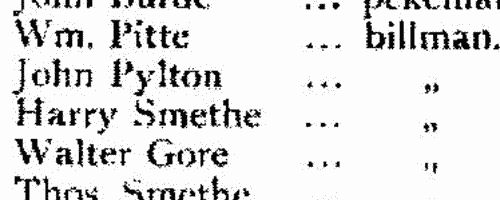
| Militia in Wellow hundred, Somerset
(1569)
A muster of the ablemen, gunners, light horsemen, pikemen, archers and billmen available from this hundred, compiled by sir Hugh Paulet, sir Maurice Barkeley, sir Ralph Hopton and John Horner in answer to a royal commission of the 11th year of queen Elizabeth. The returns are arranged by tithing. The hundred consisted of the parishes of Camerton, Comb Hay, Corston, Dunkerton, Englishcombe, Farleigh Hungerford, Forscote (Foxcote), Hinton Charterhouse, Newton St Loe, Norton St Philip, Tellisford (Telsford). Twerton (Twiverton) and Wellow, south of Bath. (The sample shown is from the return for the borough of Axbridge) | Sample scan, click to enlarge
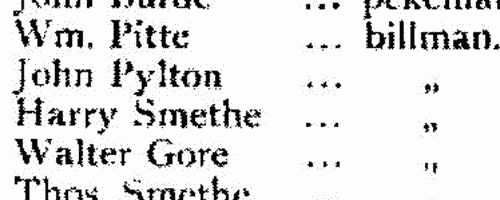
| Militia in Whitestone hundred, Somerset
(1569)
A muster of the ablemen, gunners, light horsemen, pikemen, archers and billmen available from this hundred, compiled by sir Hugh Paulet, sir Maurice Barkeley, sir Ralph Hopton and John Horner in answer to a royal commission of the 11th year of queen Elizabeth. The returns are arranged by tithing. The hundred consisted of the parishes of Batcombe, Croscombe, Ditcheat, Doulting, Downhead, East Pennard, Hornblotton, Lamyatt, Pilton, Pylle, (the borough of) Shepton Mallet and Stoke Lane (St Michael). (The sample shown is from the return for the borough of Axbridge) | Sample scan, click to enlarge
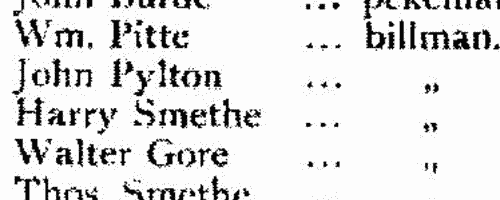
| Militia in Williton hundred, Somerset
(1569)
A muster of the ablemen, gunners, light horsemen, pikemen, archers and billmen available from this hundred, compiled by sir Hugh Paulet, sir Maurice Barkeley, sir Ralph Hopton and John Horner in answer to a royal commission of the 11th year of queen Elizabeth. The returns are arranged by tithing. The hundred consisted of the parishes of Bicknoller, Brompton Ralph, Brompton Regis, Brushford, Chipstable, Clatworthy, Crowcombe, Dodington, (the market town of) Dulverton, East Quantoxhead, Elworthy, Exton, Halse, Hawkridge, Huish Champflower, Kilton, Kilve, Lilstock, Monksilver, Nether Stowey, Nettlecombe, Old Cleeve, Raddington, St Decumans (Watchet), Sampford Brett, Skilgate, Stogumber, Upton, West Quantoxhead, Winsford and Withypool. (The sample shown is from the return for the borough of Axbridge) | Sample scan, click to enlarge
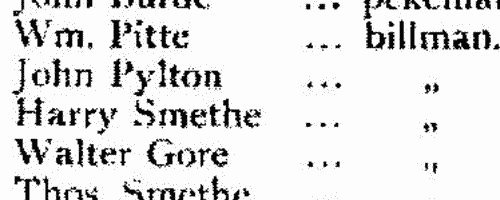
| Cecil Manuscripts
(1540-1571)
Letters and papers of the Earl of Hertford and (1551-1571) sir William Cecil, Secretary of State. Also includes some miscellaneous material as early as 1306. | Sample scan, click to enlarge
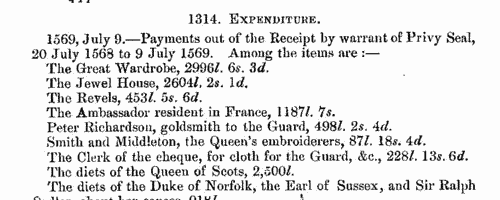
| Aliens in East Smithfield (1571)
From a general census of the 1972 aliens living in and about London, recorded in ff. 395-432 of State Papers Domestic, Elizabeth, volume 84.
| Sample scan, click to enlarge

| Aliens in St Katherine's by the Tower (1571)
'The Names and Surnames of all Straungers, denysons and others dwellyng, remayninge, and abiding within ye precinke of Sainte Katherins by ye Towre of Lonon, taken by ye Balif and ye Constables of ye same precinckt, the 19 daie of December ao 1571, and in ye 14 yeare of ye raigne of oure soueraigne Ladie Elyzabeth, by ye grace of God of Englonde, Fraunce, and Irelonde, Queene, Defender of ye Faith, etc.' This was part of a general census of the 1972 aliens living in and about London, recorded in ff. 395-432 of State Papers Domestic, Elizabeth, volume 84.
| Sample scan, click to enlarge

| Liegemen and Traitors, Pirates and Spies
(1571-1575)
The Privy Council of queen Elizabeth was responsible for internal security in England and Wales, and dealt with all manner of special and urgent matters
| Sample scan, click to enlarge

| Liegemen and Traitors, Pirates and Spies
(1575-1577)
The Privy Council of queen Elizabeth was responsible for internal security in England and Wales, and dealt with all manner of special and urgent matters
| Sample scan, click to enlarge
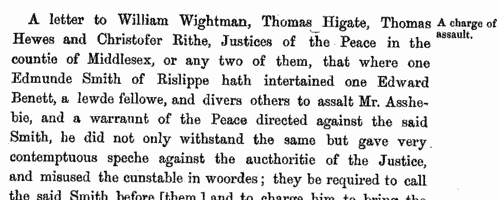
| Scottish litigants, rebels and cautioners
(1569-1578)
The Privy Council of Scotland exercised a superior judicial authority in the kingdom, and consequently received and dealt with a constant stream of petitions, as well as dealing with the internal security of the state. This register of the council from July 1569 to June 1578, in the reign of king James VI, was edited by John Hill Burton, Historiographer Royal for Scotland, and published under the direction of the Lord Clerk Register of Scotland in 1878. Some of the individuals mentioned are the complainants, those of whom they complained, and the sureties on both sides: at this period, some of the complainants are alleging serious attacks, often of a feuding nature. Many of the bonds entered into by the cautioners are promises to keep the peace towards such enemies. Failure to answer to the council when summoned was a serious contempt, leading to being denounced a rebel, with serious consequences. But 'horning' was also used in the pursuit of debts: there was no imprisonment for debt in Scotland, but a creditor could have an obstinate debtor ordered, in the sovereign's name, to pay what was due, failing which, the debtor could be put to the horn, denounced as a rebel, and imprisoned as a rebel.
| Sample scan, click to enlarge

|
Research your ancestry, family history, genealogy and one-name study by direct access to original records and archives indexed by surname.
|











